人教版八年级上册英语Unit 2 How often do you exercise?SectionB 3a-4 Self check 课件(共27张PPT)
文档属性
| 名称 | 人教版八年级上册英语Unit 2 How often do you exercise?SectionB 3a-4 Self check 课件(共27张PPT) | 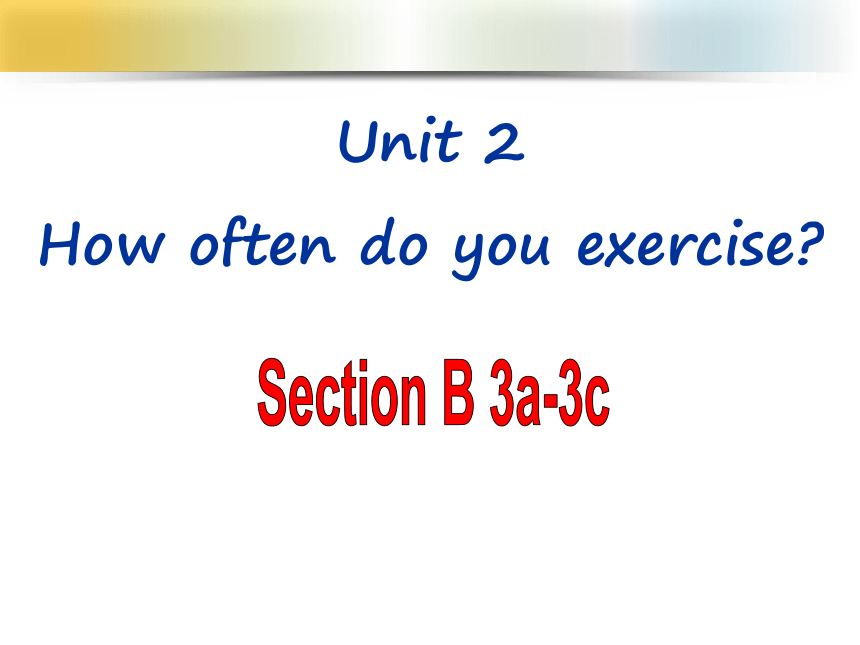 | |
| 格式 | ppt | ||
| 文件大小 | 1.0MB | ||
| 资源类型 | 教案 | ||
| 版本资源 | 人教新目标(Go for it)版 | ||
| 科目 | 英语 | ||
| 更新时间 | 2022-11-17 14:56:02 | ||
图片预览

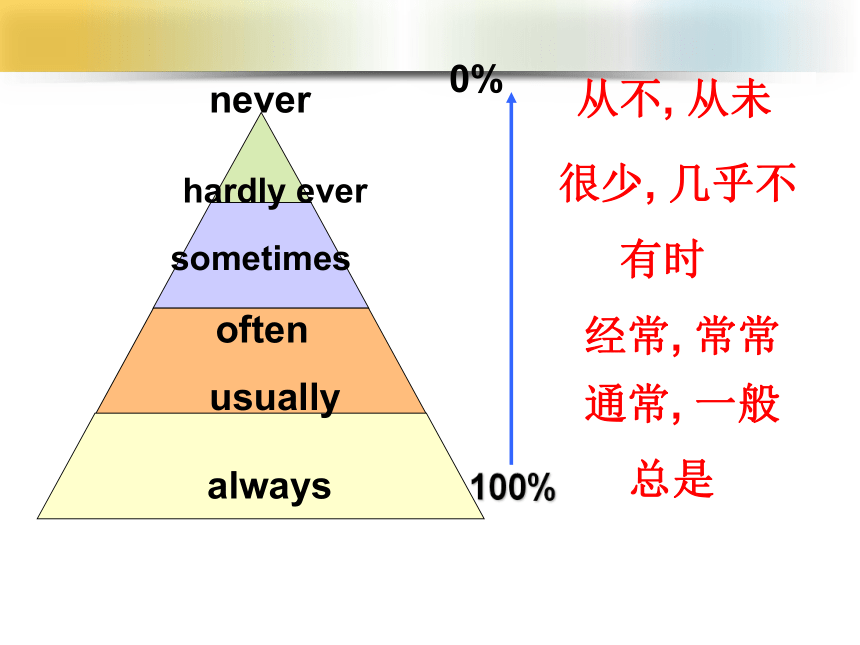
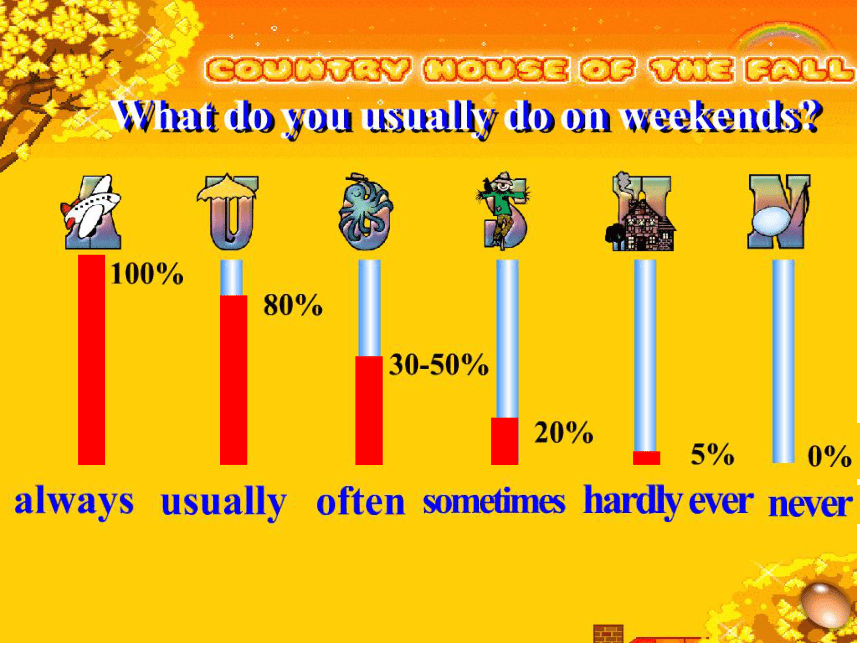
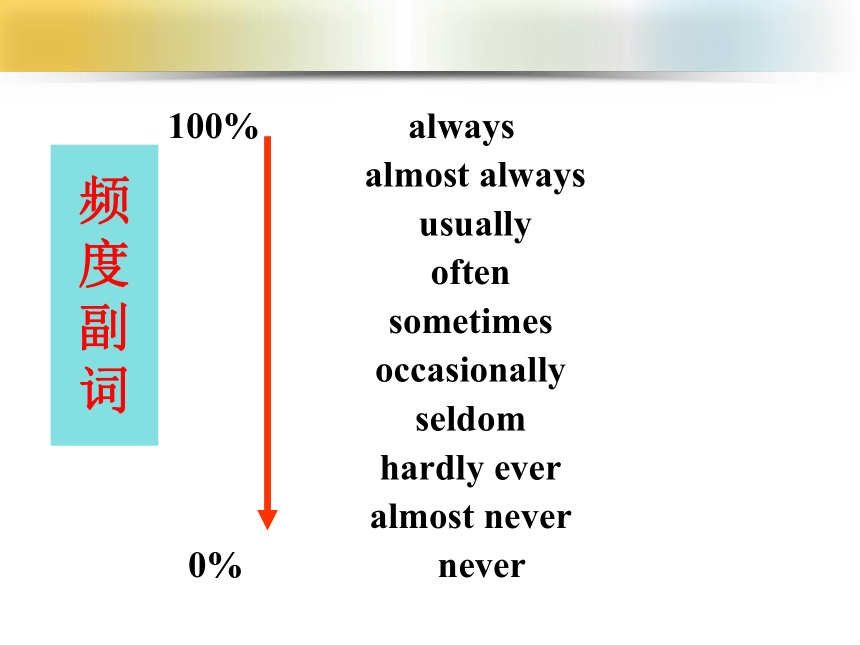




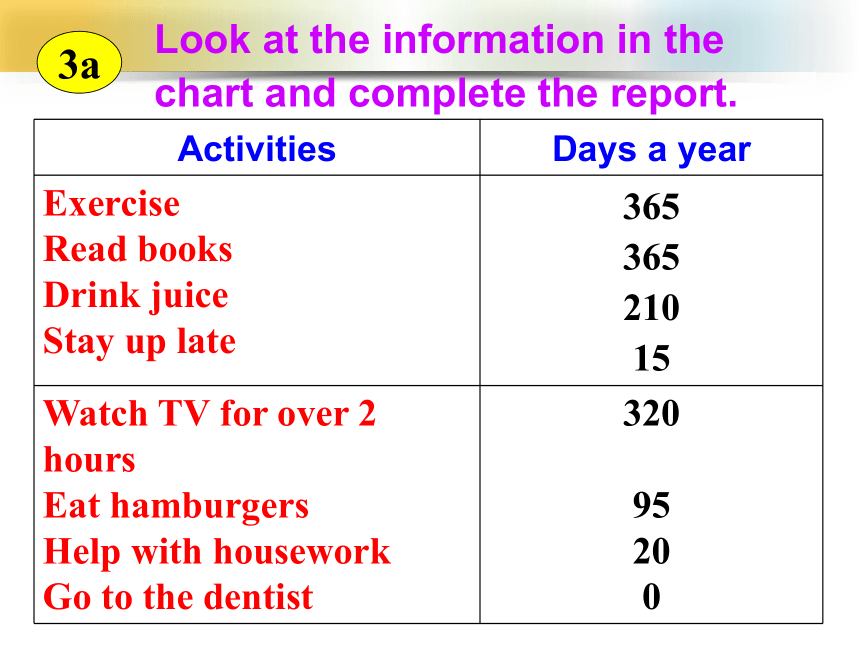
文档简介
(共27张PPT)
Unit 2
How often do you exercise
always
usually
often
sometimes
hardly ever
never
从不, 从未
很少, 几乎不
有时
经常, 常常
通常, 一般
总是
100%
0%
频度
副词
100% always
almost always
usually
often
sometimes
occasionally
seldom
hardly ever
almost never
0% never
1. however 副词,意为“然而,可是”,表示转折关系,可放在句首、句中、句末。
e.g. I was hungry, however, she gave
me some water.
我很饿,但她却给了一些水。
My father, however, didn’t drive
there. 可是我父亲没有开车去那里。
2. more than,意为“多于”,相当于over; 其反义词为less than ,意为“少于”
e.g. It never takes more than/over half
an hour to get to school.
到达学校用时从未超过半小时。
They’ll stay there for less than three
days.
他们将在呆在那里不到三天。
I hardly ever go to the dentist (看牙医).
Activities Days a year
Exercise
Read books
Drink juice
Stay up late 365
365
210
15
Watch TV for over 2 hours
Eat hamburgers
Help with housework
Go to the dentist 320
95
20
0
Look at the information in the chart and complete the report.
3a
Jane is a 16-year-old high
school student in the United
States. American Teenager magazine asked her about her habits. Jane has a lot of good habits. She always exercises and she reads books ________. Also, she ________drinks juice and she __________ stays up late.
often
every day
hardly ever
However, she has some bad habits, too. She _______ watches TV for more than two hours a day, and she __________ eats hamburgers. Her parents are not very happy because she __________ helps with housework and she ______ goes to the dentist for teeth cleaning. She says she is afraid.
usually
sometimes
hardly ever
never
3b Complete the chart with your own information. In the last column, use expressions like always, every day, twice a week and never.
Activities How often
Good habits
Bad habits
Talk about your good habits.
I read English books every day.
I usually help with the housework.
I always exercise.
I drink milk every day.
I never stay up late.
Talk about your bad habits.
I use the Internet every day.
I often eat hamburgers.
I watch TV for over two hours every day.
I hardly ever go to the dentist (看牙医).
I don’t like vegetables.
How often do you eat vegetable
How often do you eat fruits
How often do you drink milk
How often do you eat junk food
How often do you eat meat
How often do you exercise
What sports do you play
How many hours do you sleep
every night
Free talk: Talk about your habits.
Habits Activities How often
Good habits Exercise
Read books
Eat fruit
Drink milk
Stay up late
every day
always
Complete the chart with your own information. In the last column, use expressions like always, every day, twice a week and never.
3b
every day
never
twice a week
Habits Activities How often
Bad habits Watch TV for over 2 hours
Use the Internet
Eat hamburgers
Help with housework
Go to the dentist
always
often
twice a week
hardly ever
never
________________________________________
________________________________________
________________________________________
________________________________________
Write a report about your good and bad habits. Say how often you do things. Use the report in 3a as an example.
3c
本文为写自己日常生活中的好习惯与坏习惯。因此,应用一般现在时态。
首先,应在将自己的好坏习惯列个清单,标明自己做这些事情的频率。
然后,依次将这些事情完整地表达出来。
最后,通读一遍自己的文章,看有没有错误的地方。
One possible version:
Now, it’s your turn. Try your best.
I have lots of good habits. I exercise every day. I always read books. I eat fruit every day. I drink milk twice a week. I never stay up late. But I have some bad habits, too. I always watch TV for two hours a day. I use the Internet twice a week. I hardly ever help with housework. I never go to the dentist.
Healthy/unhealthy lifestyle
Lisa sleeps eight hours every night.
She eats a good breakfast and she
exercises every day. She never eats junk food.
读一读, 判断谁的生活
健康?
Healthy/unhealthy lifestyle
Jane likes to watch TV. On weekends,
she never exercises and she doesn’t
like fruits or vegetables. She eats junk
food. And Pam never goes to the
doctor.
Healthy/unhealthy lifestyle
Tom is tall and thin. He plays tennis three times a week and he runs every Saturday. He never watches TV. He eats fruits and vegetables every day and sleeps nine hours every night.
思想导致目的;目的引发行动;行动形成习惯;习惯决定性格;性格决定命运。
Thoughts lead on to purposes; purposes go forth in action; actions from habits; habits decide character; and character fixes our destiny.
Thank you!
Unit 2
How often do you exercise
always
usually
often
sometimes
hardly ever
never
从不, 从未
很少, 几乎不
有时
经常, 常常
通常, 一般
总是
100%
0%
频度
副词
100% always
almost always
usually
often
sometimes
occasionally
seldom
hardly ever
almost never
0% never
1. however 副词,意为“然而,可是”,表示转折关系,可放在句首、句中、句末。
e.g. I was hungry, however, she gave
me some water.
我很饿,但她却给了一些水。
My father, however, didn’t drive
there. 可是我父亲没有开车去那里。
2. more than,意为“多于”,相当于over; 其反义词为less than ,意为“少于”
e.g. It never takes more than/over half
an hour to get to school.
到达学校用时从未超过半小时。
They’ll stay there for less than three
days.
他们将在呆在那里不到三天。
I hardly ever go to the dentist (看牙医).
Activities Days a year
Exercise
Read books
Drink juice
Stay up late 365
365
210
15
Watch TV for over 2 hours
Eat hamburgers
Help with housework
Go to the dentist 320
95
20
0
Look at the information in the chart and complete the report.
3a
Jane is a 16-year-old high
school student in the United
States. American Teenager magazine asked her about her habits. Jane has a lot of good habits. She always exercises and she reads books ________. Also, she ________drinks juice and she __________ stays up late.
often
every day
hardly ever
However, she has some bad habits, too. She _______ watches TV for more than two hours a day, and she __________ eats hamburgers. Her parents are not very happy because she __________ helps with housework and she ______ goes to the dentist for teeth cleaning. She says she is afraid.
usually
sometimes
hardly ever
never
3b Complete the chart with your own information. In the last column, use expressions like always, every day, twice a week and never.
Activities How often
Good habits
Bad habits
Talk about your good habits.
I read English books every day.
I usually help with the housework.
I always exercise.
I drink milk every day.
I never stay up late.
Talk about your bad habits.
I use the Internet every day.
I often eat hamburgers.
I watch TV for over two hours every day.
I hardly ever go to the dentist (看牙医).
I don’t like vegetables.
How often do you eat vegetable
How often do you eat fruits
How often do you drink milk
How often do you eat junk food
How often do you eat meat
How often do you exercise
What sports do you play
How many hours do you sleep
every night
Free talk: Talk about your habits.
Habits Activities How often
Good habits Exercise
Read books
Eat fruit
Drink milk
Stay up late
every day
always
Complete the chart with your own information. In the last column, use expressions like always, every day, twice a week and never.
3b
every day
never
twice a week
Habits Activities How often
Bad habits Watch TV for over 2 hours
Use the Internet
Eat hamburgers
Help with housework
Go to the dentist
always
often
twice a week
hardly ever
never
________________________________________
________________________________________
________________________________________
________________________________________
Write a report about your good and bad habits. Say how often you do things. Use the report in 3a as an example.
3c
本文为写自己日常生活中的好习惯与坏习惯。因此,应用一般现在时态。
首先,应在将自己的好坏习惯列个清单,标明自己做这些事情的频率。
然后,依次将这些事情完整地表达出来。
最后,通读一遍自己的文章,看有没有错误的地方。
One possible version:
Now, it’s your turn. Try your best.
I have lots of good habits. I exercise every day. I always read books. I eat fruit every day. I drink milk twice a week. I never stay up late. But I have some bad habits, too. I always watch TV for two hours a day. I use the Internet twice a week. I hardly ever help with housework. I never go to the dentist.
Healthy/unhealthy lifestyle
Lisa sleeps eight hours every night.
She eats a good breakfast and she
exercises every day. She never eats junk food.
读一读, 判断谁的生活
健康?
Healthy/unhealthy lifestyle
Jane likes to watch TV. On weekends,
she never exercises and she doesn’t
like fruits or vegetables. She eats junk
food. And Pam never goes to the
doctor.
Healthy/unhealthy lifestyle
Tom is tall and thin. He plays tennis three times a week and he runs every Saturday. He never watches TV. He eats fruits and vegetables every day and sleeps nine hours every night.
思想导致目的;目的引发行动;行动形成习惯;习惯决定性格;性格决定命运。
Thoughts lead on to purposes; purposes go forth in action; actions from habits; habits decide character; and character fixes our destiny.
Thank you!
同课章节目录
- Unit 1 Where did you go on vacation?
- Section A
- Section B
- Unit 2 How often do you exercise?
- Section A
- Section B
- Unit 3 I'm more outgoing than my sister.
- Section A
- Section B
- Unit 4 What's the best movie theater?
- Section A
- Section B
- Unit 5 Do you want to watch a game show?
- Section A
- Section B
- Unit 6 I'm going to study computer science.
- Section A
- Section B
- Unit 7 Will people have robots?
- Section A
- Section B
- Unit 8 How do you make a banana milk shake?
- Section A
- Section B
- Unit 9 Can you come to my party?
- Section A
- Section B
- Unit 10 If you go to the party, you'll have a grea
- Section A
- Section B
